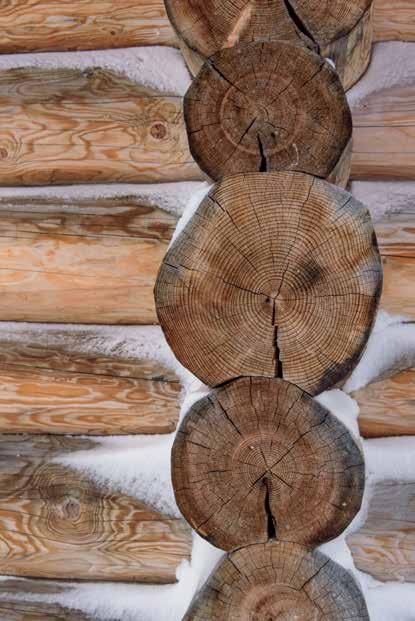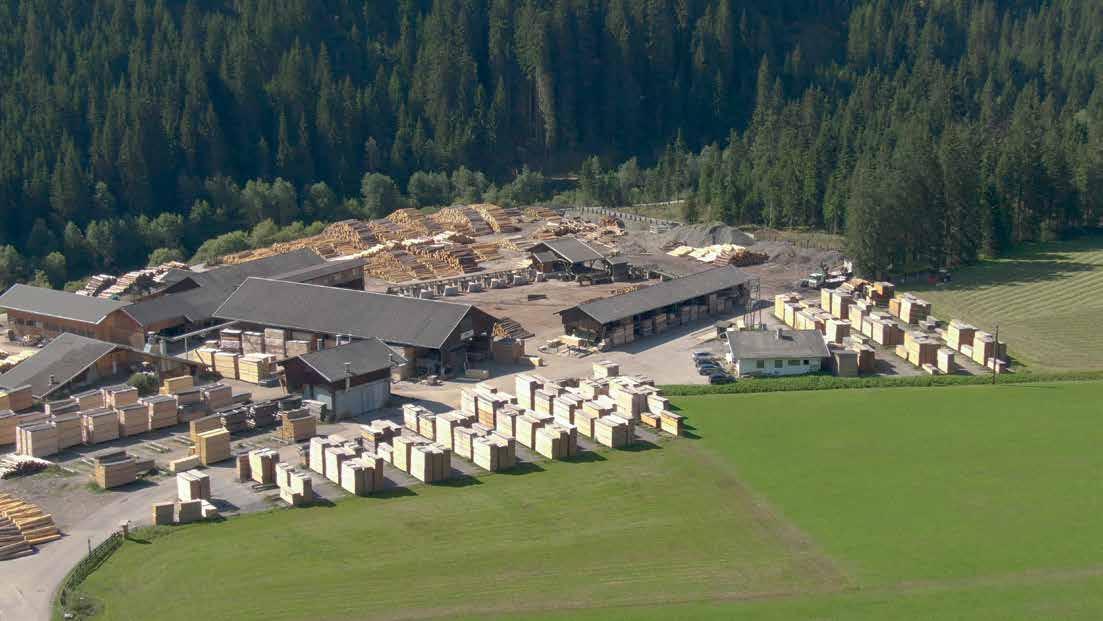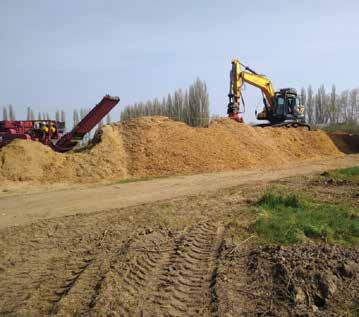
8 minute read
INDUSTRY FUNDING
Thomas Leitner, forestry expert at the Chamber of Agriculture, explains how the Austrian forestry and wood industries are organised and funded.
Forst Holz Papier (FHP) is a cooperation platform for forestry, wood and paper which relies on several host organisations. Established in 2005, its main objective is to combine the full financial power of the wood sector and to promote the use of wood using a joint up approach. The vision is for FHP to be seen as a positive creative force that represents the interests of the whole supply chain at all times.
Structure and governance At the head of FHP is the executive committee, which is the decisionmaking board of the cooperation. This group consists of representatives from all of the host organisations and industry types under the direction of the FHP chair. The Strategy Group, which consists of the chairs of the cooperation partners, is responsible for preparing the strategic orientation and for the decision–making basis. The organisation, coordination and monitoring of activities, including actions in the working groups, fall to the FHP office with the support of the cooperation partner offices.
Collection of funds The levy is voluntary for the forestry sector, but mandatory for the processing sector.
Sawlogs - Forestry When a forest owner sells sawlogs to the industry in Austria, they can voluntarily pay 30 cents/m 3 (Holzcent). Around 80% of the forest owners are willing to pay this levy. The money is collected by the industry and transferred quarterly to the federal Chamber of Agriculture.
When the forest owner sells his sawlogs for export and is willing to pay this levy, the trader has to collect this money and also transfer it to the federal Chamber of Agriculture.
FACT BOX
Cooperation Partners Forestry • Austrian Chamber of Agriculture • Austrian Forest Cooperatives • Austrian Land and Forest Owners Association Wood • Association of the Austrian Wood Industries Paper • Association of the Austrian Paper Industry Associated Members • Austrian Association of Construction Materials, Hardware and Timbertrade • Austrian Professional Association of Timber Construction • Forest Worker Association
Principles Secure supply – to improve and protect sustainable and efficient availability of wood as a raw material in Austria Promote selling – to lobby for timber sales and in each case to identify the most attractive uses along the value chain
Strategic priorities of FHP • Optimising wood availability • Positioning wood as a basic and building material • Focusing on wood and its role within the energy system • Providing market information about the timber industry • Advertising and providing information about wood • Internal marketing and communication
Working groups To fulfil the principles and strategic priorities, working groups are formed and organisations of common interest are financed or supported. • Dataservice and Wood balance • Harvesting and delivery • Woodflow and logistics • Measurement and classification of round wood • Energy
The working groups are staffed in a balanced way with experts from the forestry, wood and paper sector.
Organisations of common interest • proHolz - Image campaigning • PEFC - Certification system • Professorship (Vienna and Graz)
Depending on the federal Chamber of Agriculture, between 8 and 22 cents can be used at federal state level for the federal proHolz organisations or for its own projects.
The difference between the levy raised and the 30 cents is transferred once a year to the Austrian Chamber of Agriculture.
The Austrian Chamber of Agriculture retains e150,000 for its own projects; the rest is transferred to FHP.
Austrian State Forests pays the 30 cents/m 3 levy directly to the Austrian Chamber of Agriculture.
Sawlogs – Sawmill industry For each processed m 3 (domestic and import), the sawmill industry has to pay 25 cents to the federal association of the Austrian Wood Industries.
An additional 5 cents are raised by different projects within the sawmill industry, resulting in the sawmill industry sector paying the same 30 cents/m 3 levy as the growers sector. The other wood processing industries, such as the furniture industry, have to pay a fee calculated on the basis of the number of employees to the federal association of the Austrian Wood Industries.
Around 20 % to 25 % of the money is used at federal state level for federal proHolz; the rest is transferred to the Association of the Austrian Wood Industries.
The board industry also participates with a small amount being paid directly to the Association of the Austrian Wood Industries.
The Association of the Austrian Wood Industries retains around e900,000 for its own projects, such as the timber college in Kuchl/Salzburg.
The rest is transferred to FHP.
Q A &

Has there been controversy or opposition with regards to the fairness of the collection system? Of course, from time to time there is a discussion about fairness, especially when the market is imbalanced, as it is at the moment due to climate change.
How do you avoid free-riders? You can’t avoid free riders, especially in the forestry sector, as the fund is voluntary. There will be always a group of operators who want to do things differently from the rest. Fortunately, the number of free-riders is not very high. As this system is obligatory for the wood processing industry, there are no free-riders at all.
Use us to do your site clearance and get paid for the biomass that is produced. Top returns. Don’t get stung – use Kingwell

Protect yourself your machinery and the environment in one easy change Bulk savings available
Aspen is the fuel of choice for 1000’s of arborists across Europe. Are you one of them?
ASPENFUEL.CO.UK Find out more about the benefits of Aspen fuel and where to buy at

• No manual handling. Loads and unloads itself • Processors logs up to 15 inches diameter • Produces 6 cubic meters per hour • Supplied with 2, 4 or 6 way spiltter • Compete one person processing UK agents for
Pulpwood – Forestry Forest owners voluntarily pay 7 cents/m 3 of pulpwood sold. The money is collected by the paper industry or from Papierholz Austria, the purchasing organisation of the paper industry.
The money is transferred to the Association of the Austrian Paper Industries (AUSTROPAPIER), which transfers the money to FHP. continued from p57
Pulpwood – Paper industry For each processed mÐ of domestic wood, the paper industry voluntarily pays 10 cents to the Association of the Austrian Paper Industries (AUSTROPAPIER), which transfers the money to FHP. For imported pulpwood, 1 cent/m 3 ) s transferred.
Engaging stakeholders The main driver to set up this fund collection system was to promote and increase the use of wood. Since its inception, FHP tries to work in an effi cient way, so a continuous improvement process is part of the strategy. Stakeholder engagement is secured by the structured budget preparation as well as by stakeholders being members of the executive committee. Stakeholders are also members of the working groups. The structure has been the same since establishment, with the exception of the strategy group, which was established later as a means for discussing strategic topics.
People are regularly informed about the results of research projects. They get regular information about the additional benefi ts of FHP. For example, a focus on research into new tree species, silvicultural systems and forest genetics will deliver answers to the issue of climate change in the coming years. In this way, we can preserve the system, as the forest owners will get new knowledge about forest management and the industry will enjoy the secure availability of wood in the future. A win-win situation. In this market situation, the forest owner will not have to pay for image campaigning but will benefi t from the focus on research.
Use of collected funds within the industry
Once a year, the FHP offi ce prepares a budget in coordination with the working groups, organisations of common interest and the cooperation partners’ offi ces. This budget is intended to refl ect the principles and strategic priorities. The priorities for allocation are reviewed each year when the budget is prepared.
This budget must be approved by the strategy group, in the decision-making bodies of the cooperation partners and fi nally by the executive committee. As the budget has to pass many committees, fair and ethical use is ensured.
Examples of activities • Image campaigning • Information for professional audiences, such as architects • Research projects concerning logistics, forest management, forest genetics, harvesting • Co-fi nancing professorships in timber construction or timber architecture
• PEFC – Forest certifi cation system – Austrian forest owners incur no direct costs for certifi cation of their forests
• Creation of education and training documents (these are also used in Japan, for example) • Supporting standardisation processes for timber construction • Regular auditing of the acceptance of pulpwood
The impact of the levy Over the last few years, the share of wood buildings has increased signifi cantly and will continue to grow. The cooperation platform is unique in Europe. It has the huge advantage of enabling the sectors to work together on topics for which they have the same view and objectives, thereby allowing existing strengths to be bundled and focused. www.forstholzpapier.at
Industry funding UK update
Since October’s FTN, Confor has focused on step two of a six-step plan, which is to undertake an initial discussion with members. The aim has been to get initial feedback on the potential mechanism and to learn what it is that people would like to know, and what questions they would like answered about an Industry Fund before they would feel comfortable supporting it. Cancellation of some scheduled member meetings has meant that discussions have been more limited than planned, and time will now be taken in early 2020 to secure further feedback from more members. One clear message from the discussions held so far has been a request for more detail about what specifi c activities would be supported by a potential Fund. In response, Confor will, in consultation with a number of active businesses put together a proposed programme of work, prioritised and with approximate costs. stuartg@confor.org.uk has been a request for more detail about what specifi c activities would be supported by a potential Fund. In response, Confor will, in consultation with a number of active businesses put together a proposed programme of work, prioritised and with approximate costs. stuartg@confor.org.uk










